State Immunity: A Case Study on Diplomatic Law and Its Implications
VerifiedAdded on 2023/06/11
|6
|1461
|453
Case Study
AI Summary
This case study delves into the principles of state and diplomatic immunity within the framework of international law, focusing on the arrest and prosecution of former heads of state for international crimes. It discusses customary international law, the principle of Universal Jurisdiction, and the Foreign Immunities Act 1985 (Cth) in the context of a hypothetical scenario involving General Kyi Su. The analysis differentiates between civil and criminal cases, examines sovereign immunity as a procedural defense, and references relevant international legal instruments such as the Diplomatic Privileges and Immunities Act 1967. The study concludes that former heads of state can be prosecuted for crimes against humanity and war crimes under international law, particularly when state immunity no longer applies. Desklib provides students access to resources like this and AI-powered study tools.
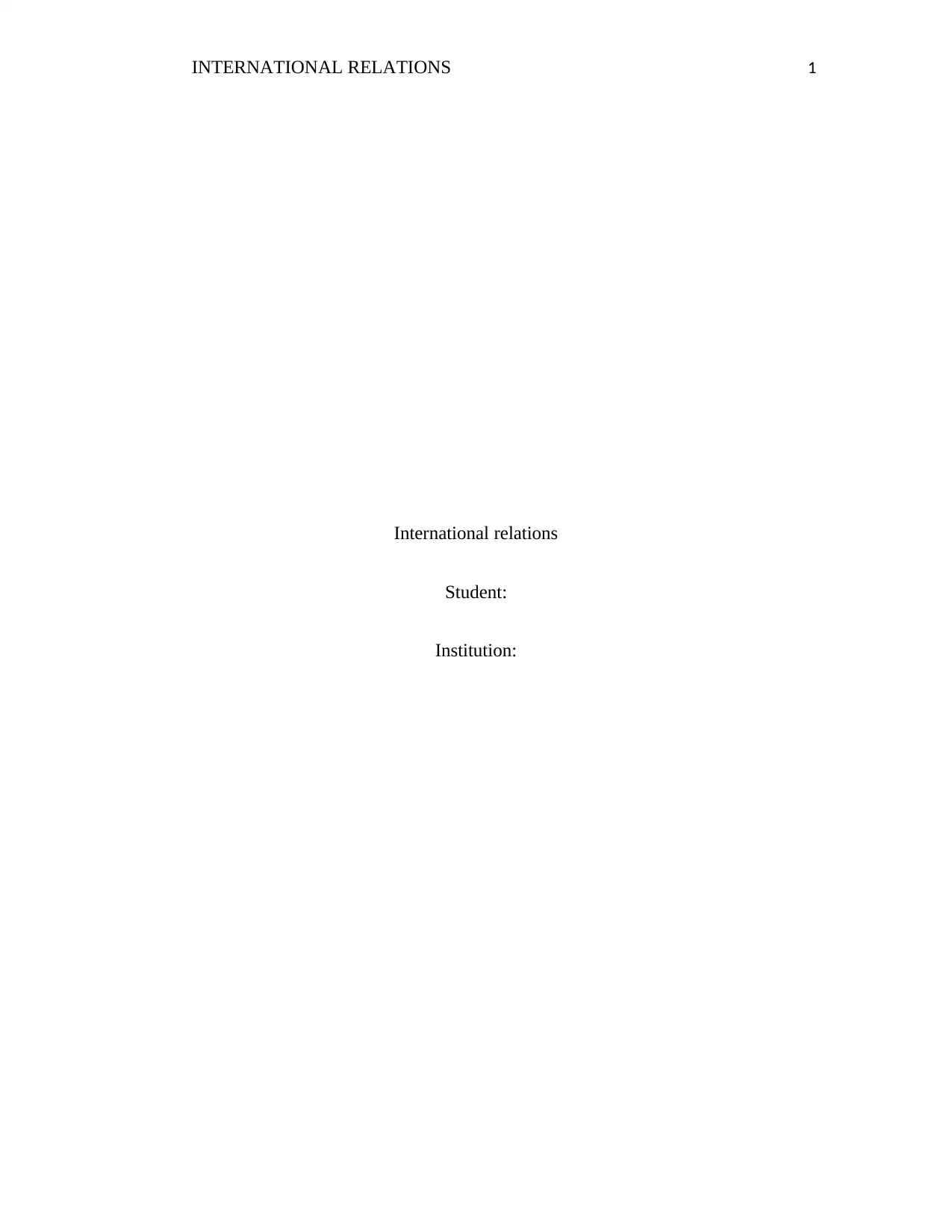
INTERNATIONAL RELATIONS 1
International relations
Student:
Institution:
International relations
Student:
Institution:
Paraphrase This Document
Need a fresh take? Get an instant paraphrase of this document with our AI Paraphraser
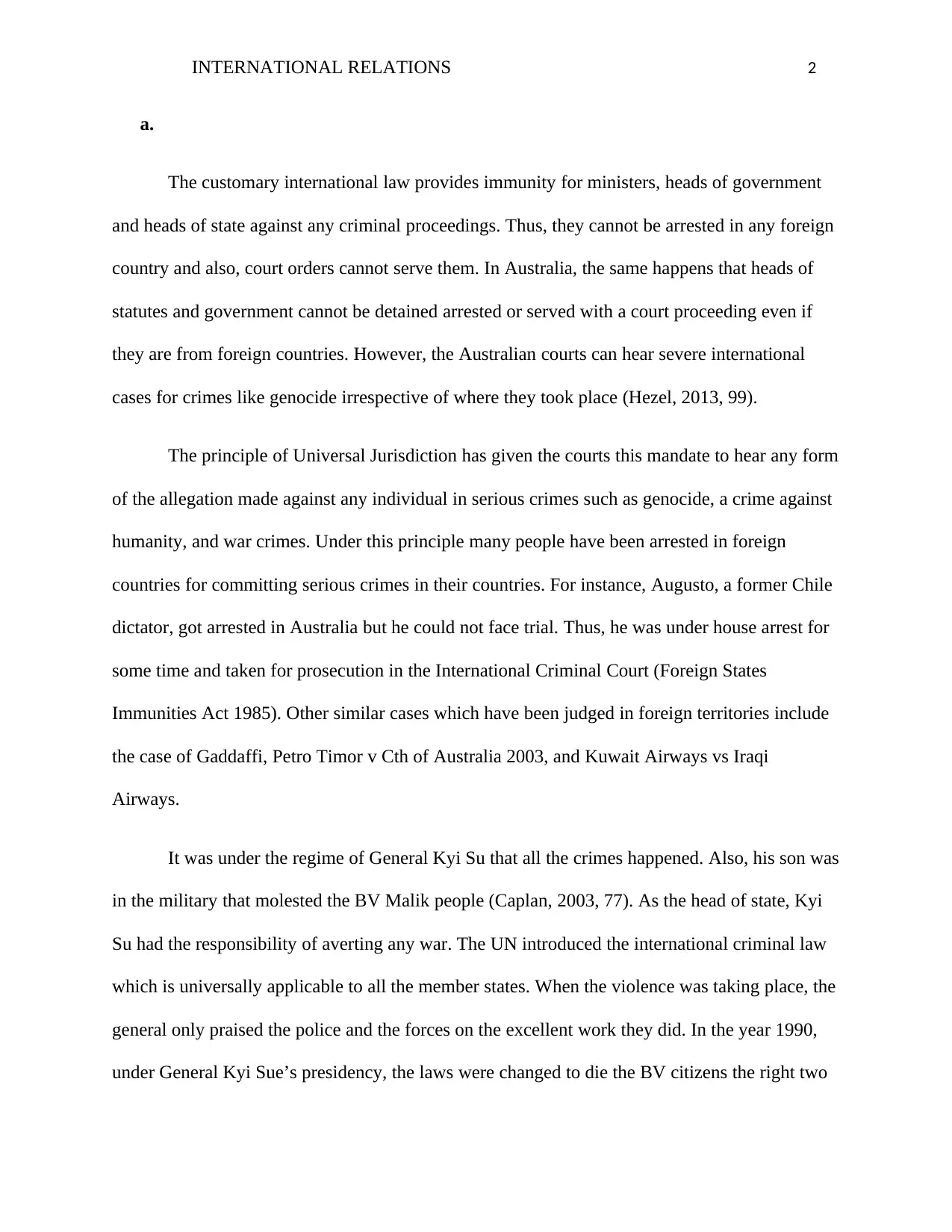
INTERNATIONAL RELATIONS 2
a.
The customary international law provides immunity for ministers, heads of government
and heads of state against any criminal proceedings. Thus, they cannot be arrested in any foreign
country and also, court orders cannot serve them. In Australia, the same happens that heads of
statutes and government cannot be detained arrested or served with a court proceeding even if
they are from foreign countries. However, the Australian courts can hear severe international
cases for crimes like genocide irrespective of where they took place (Hezel, 2013, 99).
The principle of Universal Jurisdiction has given the courts this mandate to hear any form
of the allegation made against any individual in serious crimes such as genocide, a crime against
humanity, and war crimes. Under this principle many people have been arrested in foreign
countries for committing serious crimes in their countries. For instance, Augusto, a former Chile
dictator, got arrested in Australia but he could not face trial. Thus, he was under house arrest for
some time and taken for prosecution in the International Criminal Court (Foreign States
Immunities Act 1985). Other similar cases which have been judged in foreign territories include
the case of Gaddaffi, Petro Timor v Cth of Australia 2003, and Kuwait Airways vs Iraqi
Airways.
It was under the regime of General Kyi Su that all the crimes happened. Also, his son was
in the military that molested the BV Malik people (Caplan, 2003, 77). As the head of state, Kyi
Su had the responsibility of averting any war. The UN introduced the international criminal law
which is universally applicable to all the member states. When the violence was taking place, the
general only praised the police and the forces on the excellent work they did. In the year 1990,
under General Kyi Sue’s presidency, the laws were changed to die the BV citizens the right two
a.
The customary international law provides immunity for ministers, heads of government
and heads of state against any criminal proceedings. Thus, they cannot be arrested in any foreign
country and also, court orders cannot serve them. In Australia, the same happens that heads of
statutes and government cannot be detained arrested or served with a court proceeding even if
they are from foreign countries. However, the Australian courts can hear severe international
cases for crimes like genocide irrespective of where they took place (Hezel, 2013, 99).
The principle of Universal Jurisdiction has given the courts this mandate to hear any form
of the allegation made against any individual in serious crimes such as genocide, a crime against
humanity, and war crimes. Under this principle many people have been arrested in foreign
countries for committing serious crimes in their countries. For instance, Augusto, a former Chile
dictator, got arrested in Australia but he could not face trial. Thus, he was under house arrest for
some time and taken for prosecution in the International Criminal Court (Foreign States
Immunities Act 1985). Other similar cases which have been judged in foreign territories include
the case of Gaddaffi, Petro Timor v Cth of Australia 2003, and Kuwait Airways vs Iraqi
Airways.
It was under the regime of General Kyi Su that all the crimes happened. Also, his son was
in the military that molested the BV Malik people (Caplan, 2003, 77). As the head of state, Kyi
Su had the responsibility of averting any war. The UN introduced the international criminal law
which is universally applicable to all the member states. When the violence was taking place, the
general only praised the police and the forces on the excellent work they did. In the year 1990,
under General Kyi Sue’s presidency, the laws were changed to die the BV citizens the right two
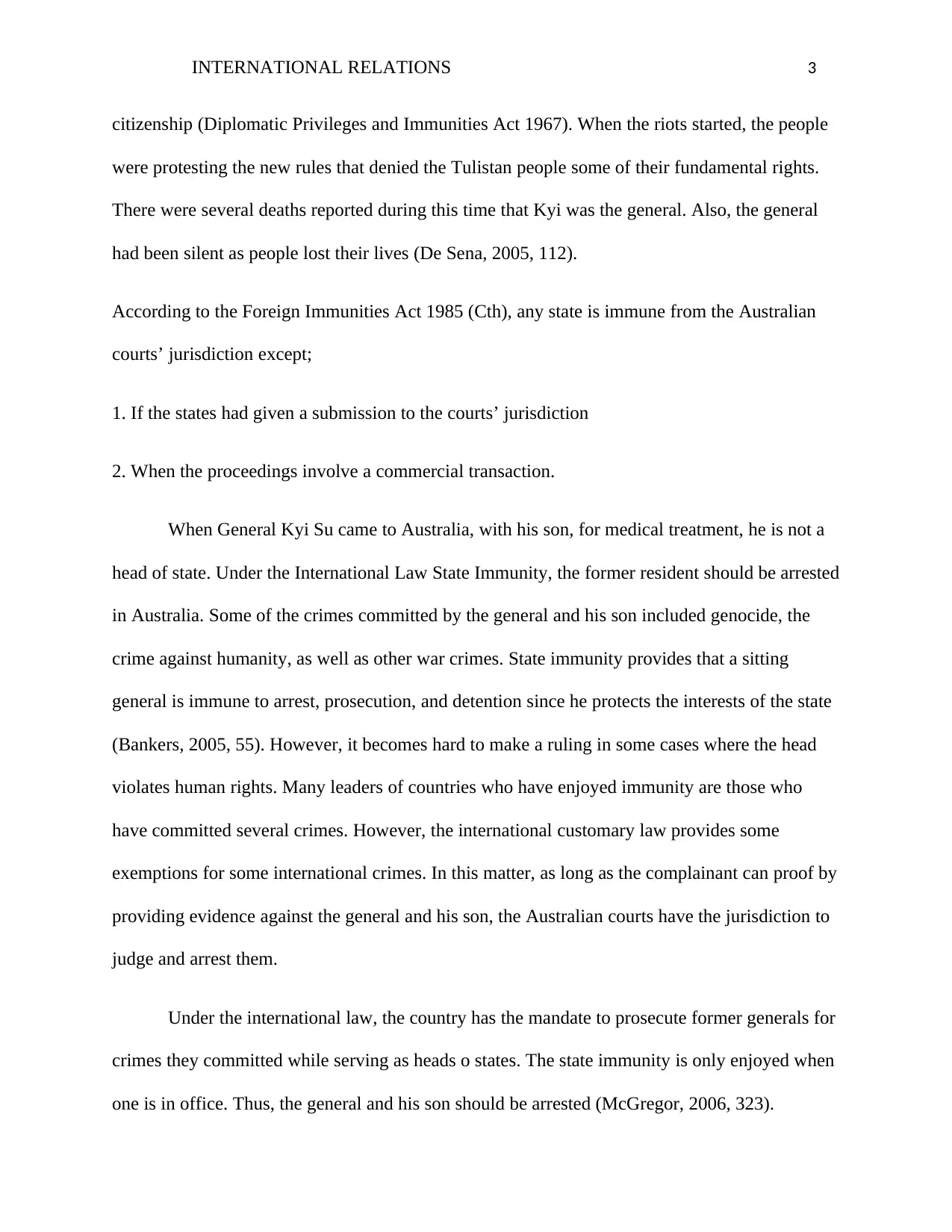
INTERNATIONAL RELATIONS 3
citizenship (Diplomatic Privileges and Immunities Act 1967). When the riots started, the people
were protesting the new rules that denied the Tulistan people some of their fundamental rights.
There were several deaths reported during this time that Kyi was the general. Also, the general
had been silent as people lost their lives (De Sena, 2005, 112).
According to the Foreign Immunities Act 1985 (Cth), any state is immune from the Australian
courts’ jurisdiction except;
1. If the states had given a submission to the courts’ jurisdiction
2. When the proceedings involve a commercial transaction.
When General Kyi Su came to Australia, with his son, for medical treatment, he is not a
head of state. Under the International Law State Immunity, the former resident should be arrested
in Australia. Some of the crimes committed by the general and his son included genocide, the
crime against humanity, as well as other war crimes. State immunity provides that a sitting
general is immune to arrest, prosecution, and detention since he protects the interests of the state
(Bankers, 2005, 55). However, it becomes hard to make a ruling in some cases where the head
violates human rights. Many leaders of countries who have enjoyed immunity are those who
have committed several crimes. However, the international customary law provides some
exemptions for some international crimes. In this matter, as long as the complainant can proof by
providing evidence against the general and his son, the Australian courts have the jurisdiction to
judge and arrest them.
Under the international law, the country has the mandate to prosecute former generals for
crimes they committed while serving as heads o states. The state immunity is only enjoyed when
one is in office. Thus, the general and his son should be arrested (McGregor, 2006, 323).
citizenship (Diplomatic Privileges and Immunities Act 1967). When the riots started, the people
were protesting the new rules that denied the Tulistan people some of their fundamental rights.
There were several deaths reported during this time that Kyi was the general. Also, the general
had been silent as people lost their lives (De Sena, 2005, 112).
According to the Foreign Immunities Act 1985 (Cth), any state is immune from the Australian
courts’ jurisdiction except;
1. If the states had given a submission to the courts’ jurisdiction
2. When the proceedings involve a commercial transaction.
When General Kyi Su came to Australia, with his son, for medical treatment, he is not a
head of state. Under the International Law State Immunity, the former resident should be arrested
in Australia. Some of the crimes committed by the general and his son included genocide, the
crime against humanity, as well as other war crimes. State immunity provides that a sitting
general is immune to arrest, prosecution, and detention since he protects the interests of the state
(Bankers, 2005, 55). However, it becomes hard to make a ruling in some cases where the head
violates human rights. Many leaders of countries who have enjoyed immunity are those who
have committed several crimes. However, the international customary law provides some
exemptions for some international crimes. In this matter, as long as the complainant can proof by
providing evidence against the general and his son, the Australian courts have the jurisdiction to
judge and arrest them.
Under the international law, the country has the mandate to prosecute former generals for
crimes they committed while serving as heads o states. The state immunity is only enjoyed when
one is in office. Thus, the general and his son should be arrested (McGregor, 2006, 323).
⊘ This is a preview!⊘
Do you want full access?
Subscribe today to unlock all pages.

Trusted by 1+ million students worldwide
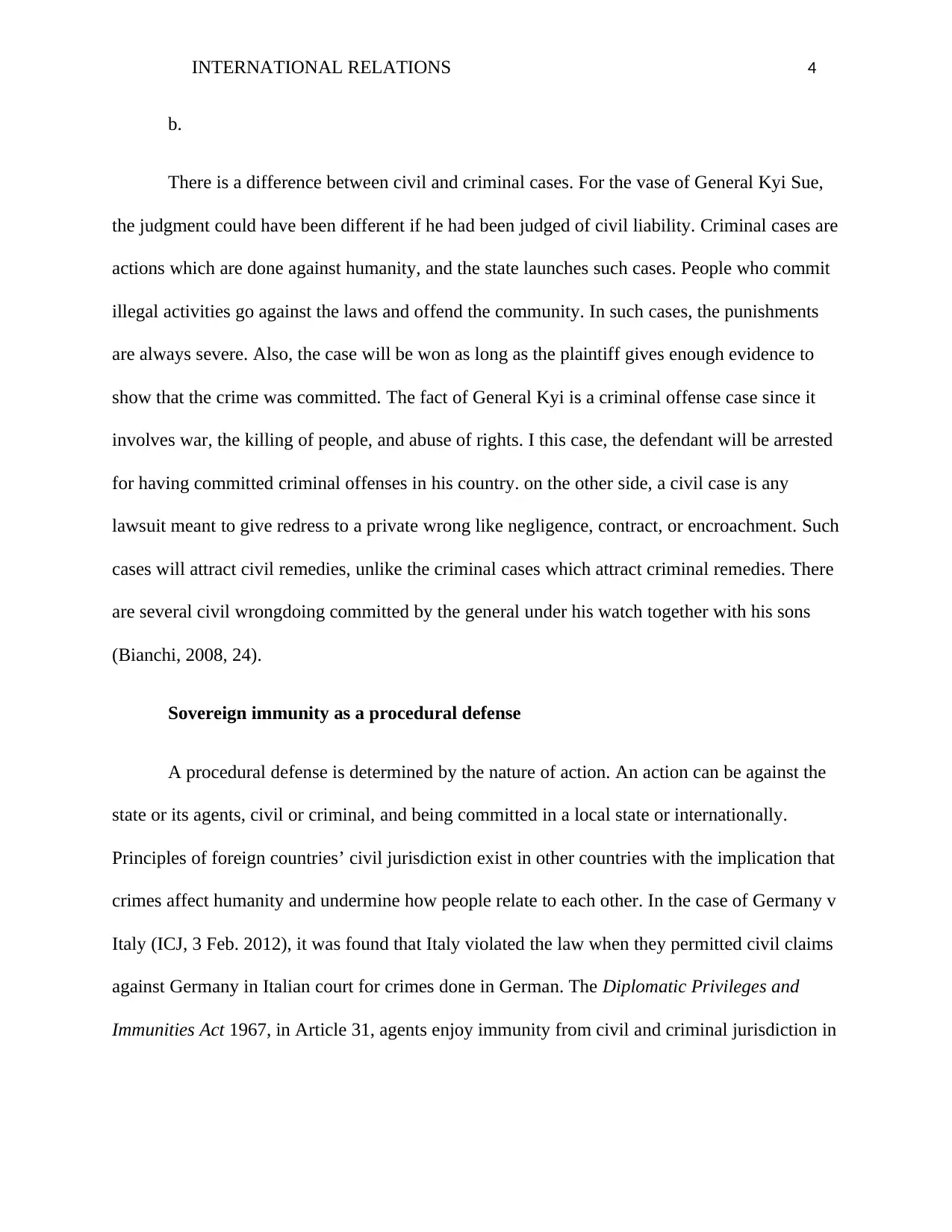
INTERNATIONAL RELATIONS 4
b.
There is a difference between civil and criminal cases. For the vase of General Kyi Sue,
the judgment could have been different if he had been judged of civil liability. Criminal cases are
actions which are done against humanity, and the state launches such cases. People who commit
illegal activities go against the laws and offend the community. In such cases, the punishments
are always severe. Also, the case will be won as long as the plaintiff gives enough evidence to
show that the crime was committed. The fact of General Kyi is a criminal offense case since it
involves war, the killing of people, and abuse of rights. I this case, the defendant will be arrested
for having committed criminal offenses in his country. on the other side, a civil case is any
lawsuit meant to give redress to a private wrong like negligence, contract, or encroachment. Such
cases will attract civil remedies, unlike the criminal cases which attract criminal remedies. There
are several civil wrongdoing committed by the general under his watch together with his sons
(Bianchi, 2008, 24).
Sovereign immunity as a procedural defense
A procedural defense is determined by the nature of action. An action can be against the
state or its agents, civil or criminal, and being committed in a local state or internationally.
Principles of foreign countries’ civil jurisdiction exist in other countries with the implication that
crimes affect humanity and undermine how people relate to each other. In the case of Germany v
Italy (ICJ, 3 Feb. 2012), it was found that Italy violated the law when they permitted civil claims
against Germany in Italian court for crimes done in German. The Diplomatic Privileges and
Immunities Act 1967, in Article 31, agents enjoy immunity from civil and criminal jurisdiction in
b.
There is a difference between civil and criminal cases. For the vase of General Kyi Sue,
the judgment could have been different if he had been judged of civil liability. Criminal cases are
actions which are done against humanity, and the state launches such cases. People who commit
illegal activities go against the laws and offend the community. In such cases, the punishments
are always severe. Also, the case will be won as long as the plaintiff gives enough evidence to
show that the crime was committed. The fact of General Kyi is a criminal offense case since it
involves war, the killing of people, and abuse of rights. I this case, the defendant will be arrested
for having committed criminal offenses in his country. on the other side, a civil case is any
lawsuit meant to give redress to a private wrong like negligence, contract, or encroachment. Such
cases will attract civil remedies, unlike the criminal cases which attract criminal remedies. There
are several civil wrongdoing committed by the general under his watch together with his sons
(Bianchi, 2008, 24).
Sovereign immunity as a procedural defense
A procedural defense is determined by the nature of action. An action can be against the
state or its agents, civil or criminal, and being committed in a local state or internationally.
Principles of foreign countries’ civil jurisdiction exist in other countries with the implication that
crimes affect humanity and undermine how people relate to each other. In the case of Germany v
Italy (ICJ, 3 Feb. 2012), it was found that Italy violated the law when they permitted civil claims
against Germany in Italian court for crimes done in German. The Diplomatic Privileges and
Immunities Act 1967, in Article 31, agents enjoy immunity from civil and criminal jurisdiction in
Paraphrase This Document
Need a fresh take? Get an instant paraphrase of this document with our AI Paraphraser
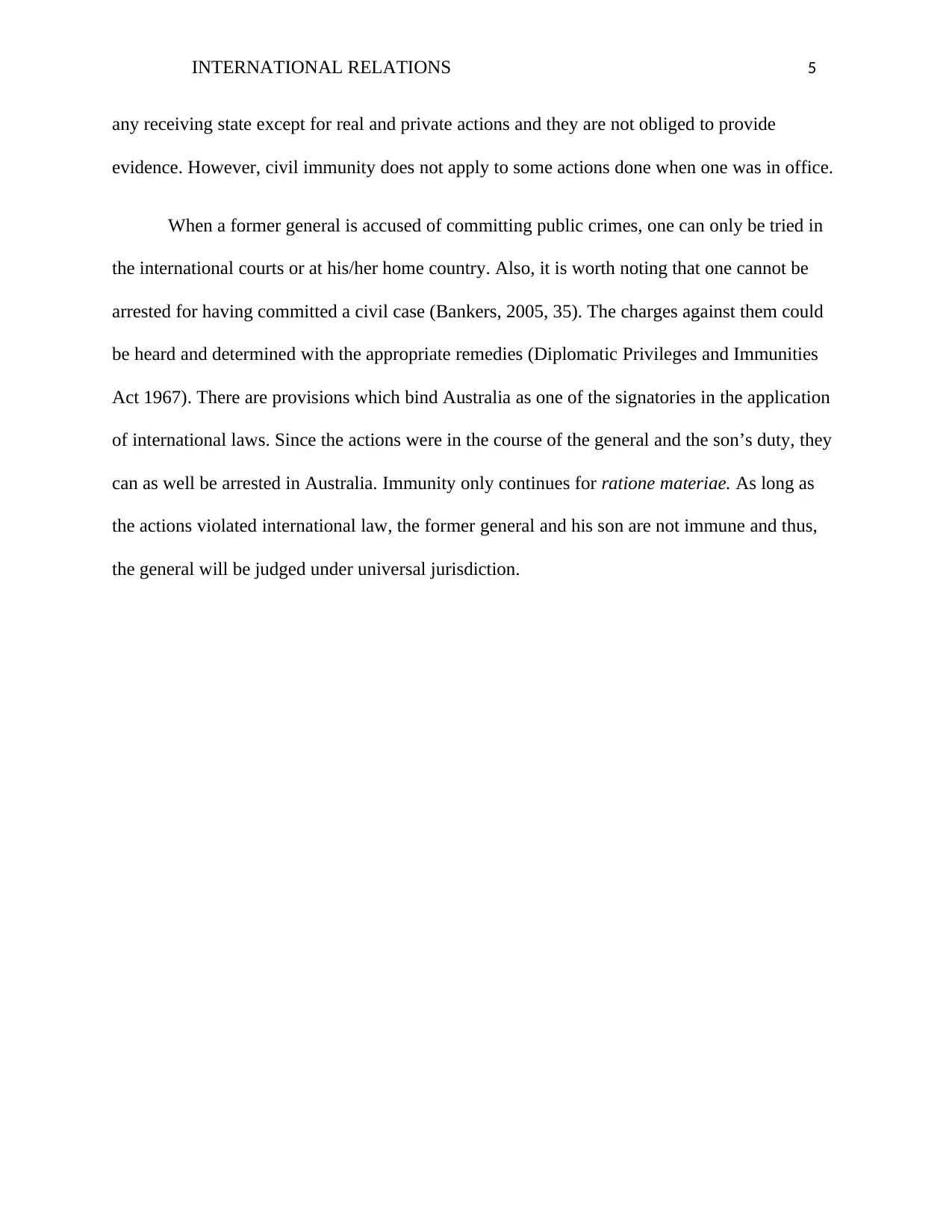
INTERNATIONAL RELATIONS 5
any receiving state except for real and private actions and they are not obliged to provide
evidence. However, civil immunity does not apply to some actions done when one was in office.
When a former general is accused of committing public crimes, one can only be tried in
the international courts or at his/her home country. Also, it is worth noting that one cannot be
arrested for having committed a civil case (Bankers, 2005, 35). The charges against them could
be heard and determined with the appropriate remedies (Diplomatic Privileges and Immunities
Act 1967). There are provisions which bind Australia as one of the signatories in the application
of international laws. Since the actions were in the course of the general and the son’s duty, they
can as well be arrested in Australia. Immunity only continues for ratione materiae. As long as
the actions violated international law, the former general and his son are not immune and thus,
the general will be judged under universal jurisdiction.
any receiving state except for real and private actions and they are not obliged to provide
evidence. However, civil immunity does not apply to some actions done when one was in office.
When a former general is accused of committing public crimes, one can only be tried in
the international courts or at his/her home country. Also, it is worth noting that one cannot be
arrested for having committed a civil case (Bankers, 2005, 35). The charges against them could
be heard and determined with the appropriate remedies (Diplomatic Privileges and Immunities
Act 1967). There are provisions which bind Australia as one of the signatories in the application
of international laws. Since the actions were in the course of the general and the son’s duty, they
can as well be arrested in Australia. Immunity only continues for ratione materiae. As long as
the actions violated international law, the former general and his son are not immune and thus,
the general will be judged under universal jurisdiction.
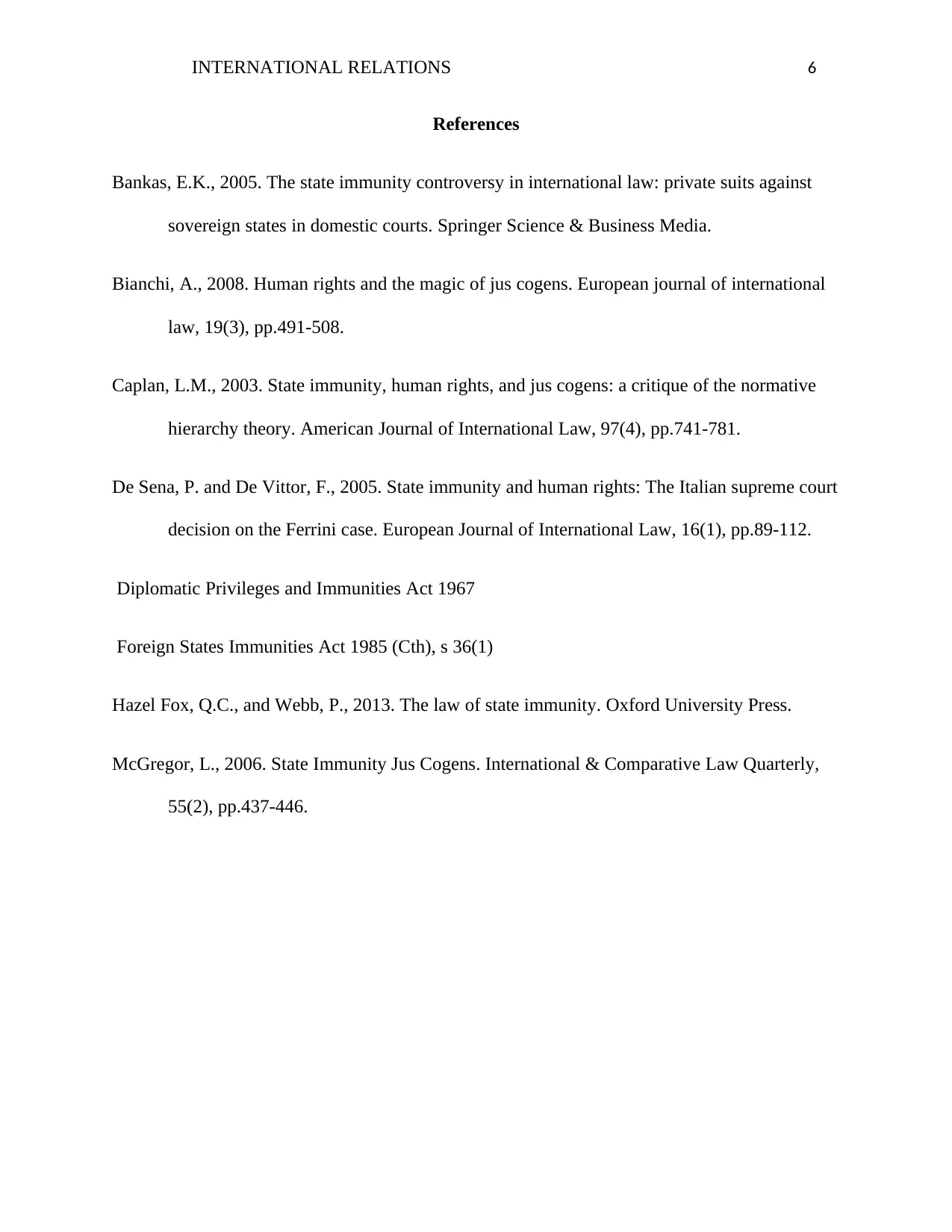
INTERNATIONAL RELATIONS 6
References
Bankas, E.K., 2005. The state immunity controversy in international law: private suits against
sovereign states in domestic courts. Springer Science & Business Media.
Bianchi, A., 2008. Human rights and the magic of jus cogens. European journal of international
law, 19(3), pp.491-508.
Caplan, L.M., 2003. State immunity, human rights, and jus cogens: a critique of the normative
hierarchy theory. American Journal of International Law, 97(4), pp.741-781.
De Sena, P. and De Vittor, F., 2005. State immunity and human rights: The Italian supreme court
decision on the Ferrini case. European Journal of International Law, 16(1), pp.89-112.
Diplomatic Privileges and Immunities Act 1967
Foreign States Immunities Act 1985 (Cth), s 36(1)
Hazel Fox, Q.C., and Webb, P., 2013. The law of state immunity. Oxford University Press.
McGregor, L., 2006. State Immunity Jus Cogens. International & Comparative Law Quarterly,
55(2), pp.437-446.
References
Bankas, E.K., 2005. The state immunity controversy in international law: private suits against
sovereign states in domestic courts. Springer Science & Business Media.
Bianchi, A., 2008. Human rights and the magic of jus cogens. European journal of international
law, 19(3), pp.491-508.
Caplan, L.M., 2003. State immunity, human rights, and jus cogens: a critique of the normative
hierarchy theory. American Journal of International Law, 97(4), pp.741-781.
De Sena, P. and De Vittor, F., 2005. State immunity and human rights: The Italian supreme court
decision on the Ferrini case. European Journal of International Law, 16(1), pp.89-112.
Diplomatic Privileges and Immunities Act 1967
Foreign States Immunities Act 1985 (Cth), s 36(1)
Hazel Fox, Q.C., and Webb, P., 2013. The law of state immunity. Oxford University Press.
McGregor, L., 2006. State Immunity Jus Cogens. International & Comparative Law Quarterly,
55(2), pp.437-446.
⊘ This is a preview!⊘
Do you want full access?
Subscribe today to unlock all pages.

Trusted by 1+ million students worldwide
1 out of 6
Related Documents
Your All-in-One AI-Powered Toolkit for Academic Success.
+13062052269
info@desklib.com
Available 24*7 on WhatsApp / Email
![[object Object]](/_next/static/media/star-bottom.7253800d.svg)
Unlock your academic potential
Copyright © 2020–2026 A2Z Services. All Rights Reserved. Developed and managed by ZUCOL.





